Your digital reputation has become a make-or-break factor in today’s business world. Studies show that 93% of buyers let online reviews guide their purchasing choices. Most consumers – about 70% – read one to six customer reviews before they buy anything.
The right online reputation management tools help businesses stay ahead of potential brand issues by spotting and handling negative feedback quickly. These smart monitoring systems track what people say about your brand everywhere online, even where you don’t have a presence. Quality reputation management software brings real results – loyal customers, new business chances, better hiring success, and lower marketing costs. Many companies looking for adaptable digital marketing solutions realize that reputation monitoring software gives them the insights they need to protect and boost their brand image.
The best reputation management tools can change how businesses handle customer feedback completely. Take Meltwater with its extensive source coverage or SOCi’s ability to manage multiple locations at once. This ranking breaks down ten powerful platforms that help companies control their online presence in 2025.
Birdeye
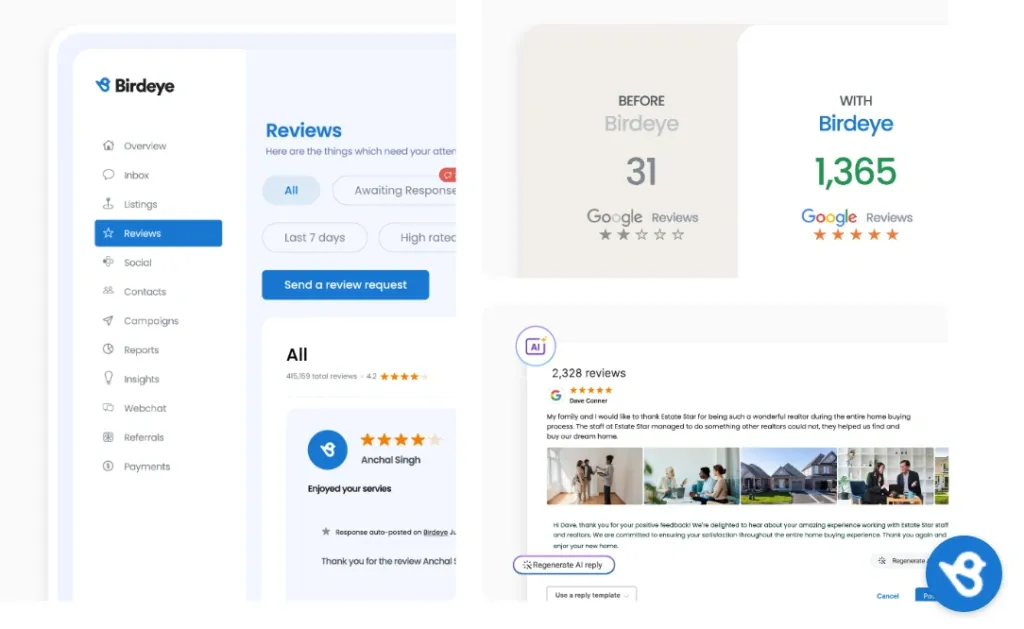
Image Source: Birdeye
Birdeye key features
Birdeye pros and cons
Pros:
- Works with popular CRMs like Salesforce, HubSpot, and Zoho
- Review management on the go with mobile access
- AI analyzes customer sentiment to find areas that need improvement
- Agencies can use white-label reporting
- Digital marketing integration helps manage your brand better
Cons:
Plans start at $299 monthly which might be tough for small businesses Few integration options beyond major CRMs No free version (just a 15-day trial) Support team only available during business hours
Birdeye pricing
Best use case for Birdeye
Multi-location businesses that need to manage their reputation from one place will find Birdeye especially valuable.
Podium
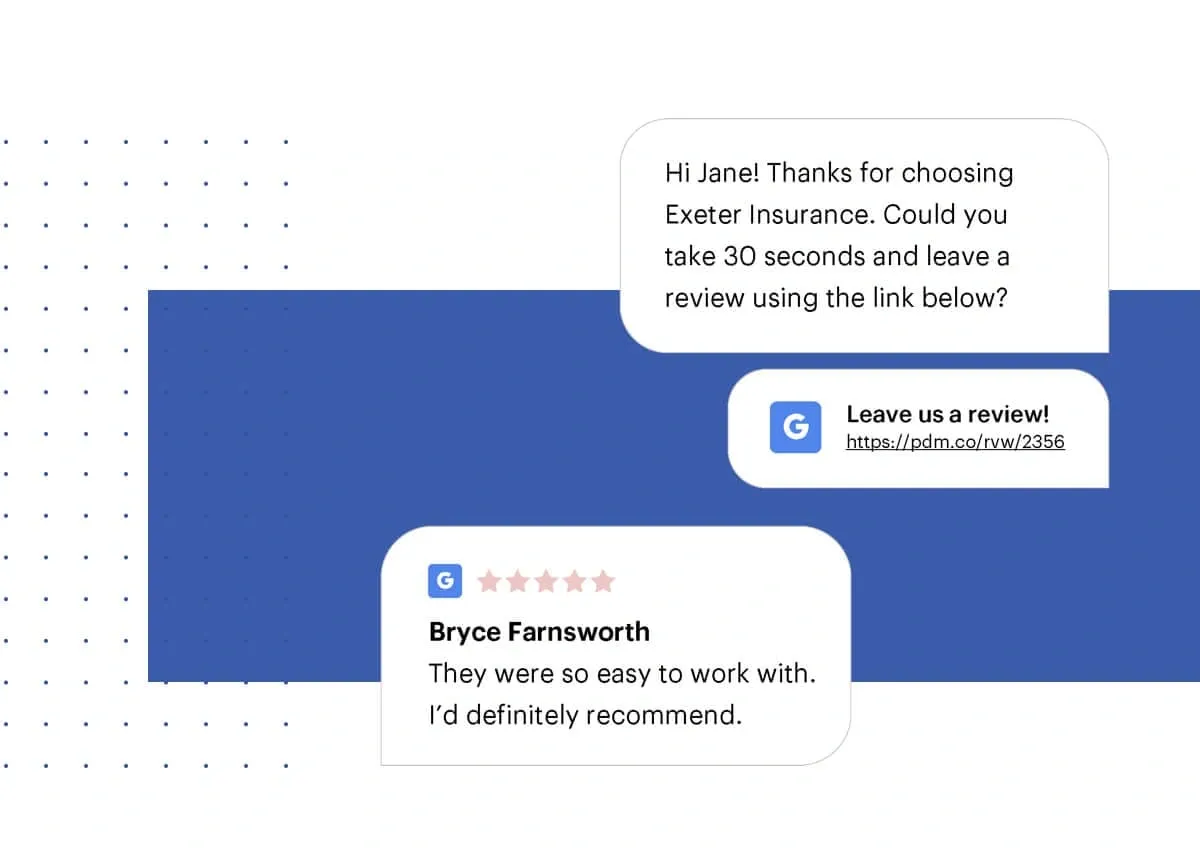
Image Source: Podium
Podium helps businesses improve customer interactions with its AI-powered platform. The platform specializes in SMS messaging and digital reputation management.
Podium key features
Podium brings all customer messages into one dashboard.
Podium pros and cons
Pros:
Simple review collection through text messaging Safe text payment options that customers find convenient Easy-to-use platform that works for staff with different tech skills One place for all platform communications Complete reporting to track review performance
Cons:
Message alerts aren’t reliable and thus may delay communication Some CRM systems don’t work well with it Prices are high and go up with extra features Search doesn’t work well and support is hit-or-miss Basic social media management tools
Podium pricing
Podium has three price levels:
Core: $399/month for up to 2 locations and 1-4 users Pro: $599/month with up to 5 locations and unlimited users Signature: Custom pricing for advanced multi-location management
Every plan has basic features like combined messaging and review management.
Best use case for Podium
Yext
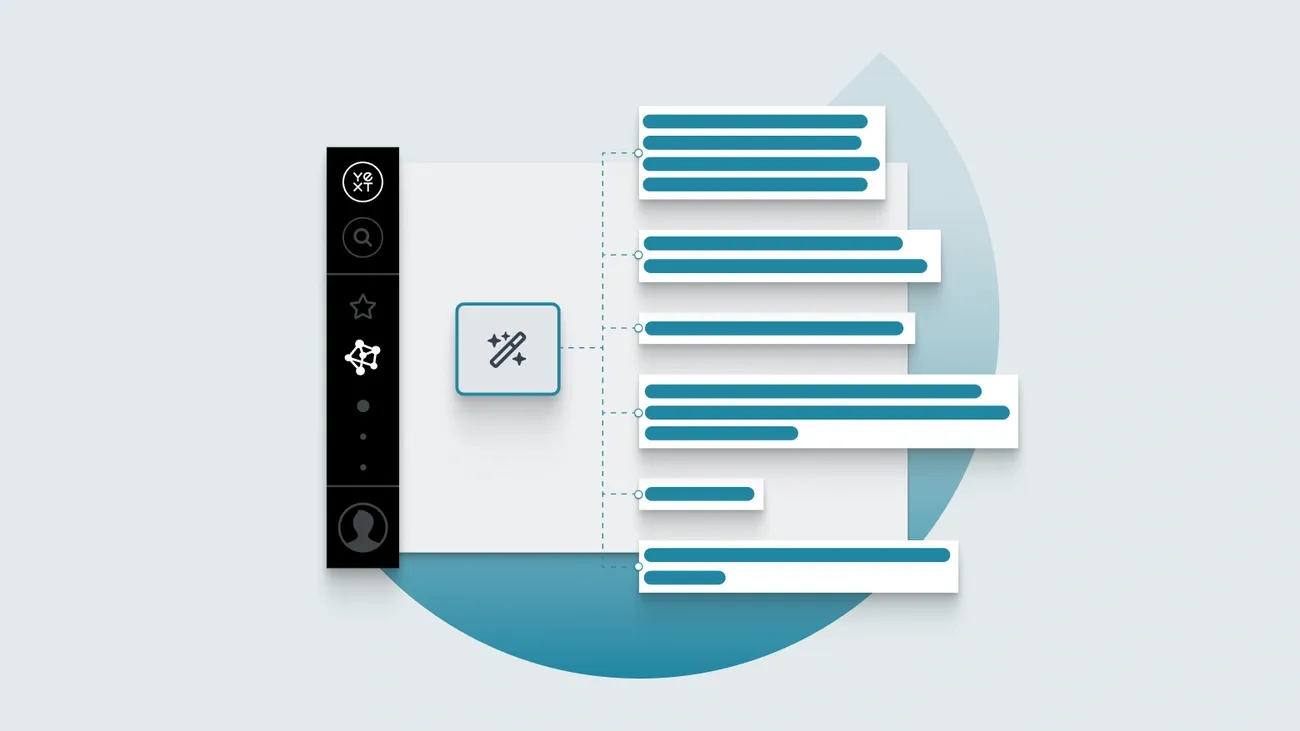
Image Source: Yext
Yext is a robust digital presence platform that helps businesses control their information across 175+ online platforms. The platform provides detailed online reputation management solutions that multi-location brands need.
Yext key features
Yext provides a detailed suite of reputation management tools built around four main capabilities.
Yext pros and cons
Pros:
Immediate notifications for new reviews with custom alerts Powerful analytics to track listing performance in search results AI-powered sentiment analysis that spots trends in customer feedback 96.86% increase in 5-star reviews for businesses using the platform Competitive intelligence tracking for up to 5 local competitors
Cons:
Pricing lacks transparency with mostly custom quotes Small businesses might find it hard to learn Costs increase rapidly for multi-location businesses Some reporting features have limited customization options User experience depends heavily on third-party integrations
Yext pricing
Yext uses tiered pricing based on business size and needs.
Best use case for Yext
Large enterprises with multiple locations will find Yext exceptionally useful for maintaining consistent brand information across digital channels.
NiceJob
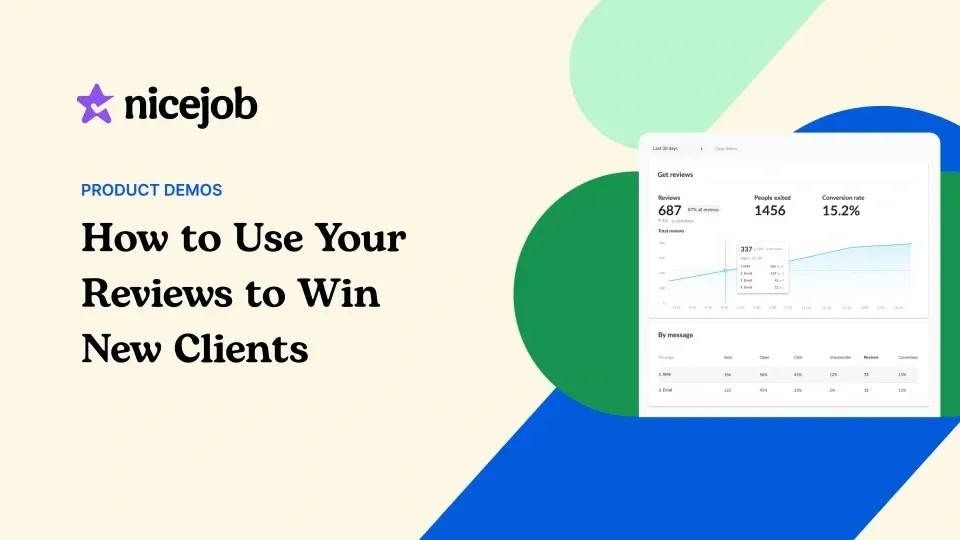
Image Source: NiceJob
NiceJob helps small businesses automate their reputation marketing.
NiceJob key features
The platform’s “set-and-forget” review generation system makes it stand out.
NiceJob pros and cons
Pros:
- Review collection system runs on autopilot with smart reminders
- Combines smoothly with popular CRMs like Jobber, Quickbooks, and Housecall Pro
- Advanced sentiment analysis for reviews
- Social media automation saves time
Customer support rated [4.9/5]
Cons:
- Free version offers less than competitors
- AI sometimes fails to detect already-submitted reviews
- Some integrations need manual data entry
- Social media features have limited customization options
- Larger customer bases face higher pricing tiers
NiceJob pricing
The platform’s pricing structure depends on customer volume.
Best use case for NiceJob
Service-based small businesses benefit most from NiceJob because their reputation directly affects revenue. Home services companies, healthcare providers, real estate professionals, and hospitality businesses see great results from this platform’s efficient review collection.
BrightLocal
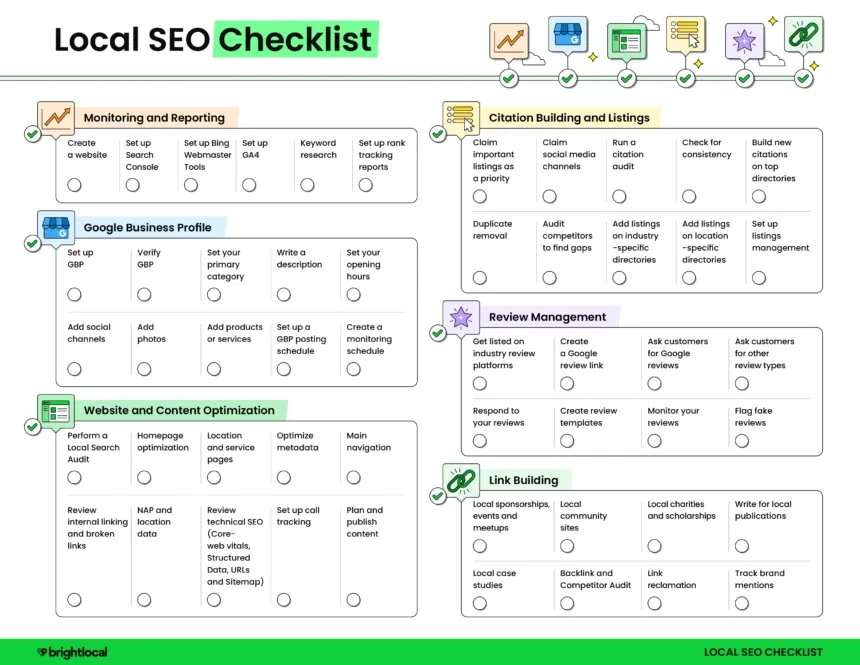
Image Source: BrightLocal
BrightLocal is a specialized local SEO and reputation management platform. The platform helps businesses improve their local search visibility and manage online reviews.
BrightLocal key features
BrightLocal has a detailed suite of local SEO and reputation management tools.
BrightLocal pros and cons
Pros:
The accessible interface makes navigation simple Businesses own their listings permanently without recurring citation fees Agency-friendly white-label dashboards and reporting Detailed local citation building and management in 10 countries The platform guarantees 70% of citations will be live within four weeks
Cons:
Report generation takes time Keyword research tools are not available The platform lacks conversion improvement data SEO beginners need time to learn the system Some citation submissions might not go live
BrightLocal pricing
Best use case for BrightLocal
Local businesses that need to improve their geographic search visibility will find BrightLocal valuable. Small to medium businesses with physical locations benefit from its local SEO focus. Marketing agencies love its white-label reporting and multi-location management features. The platform works best for businesses that want to build and manage citations while tracking reviews on multiple platforms. BrightLocal becomes the right choice for companies that want to build their local digital presence without paying ongoing fees to manage citations.
SOCi
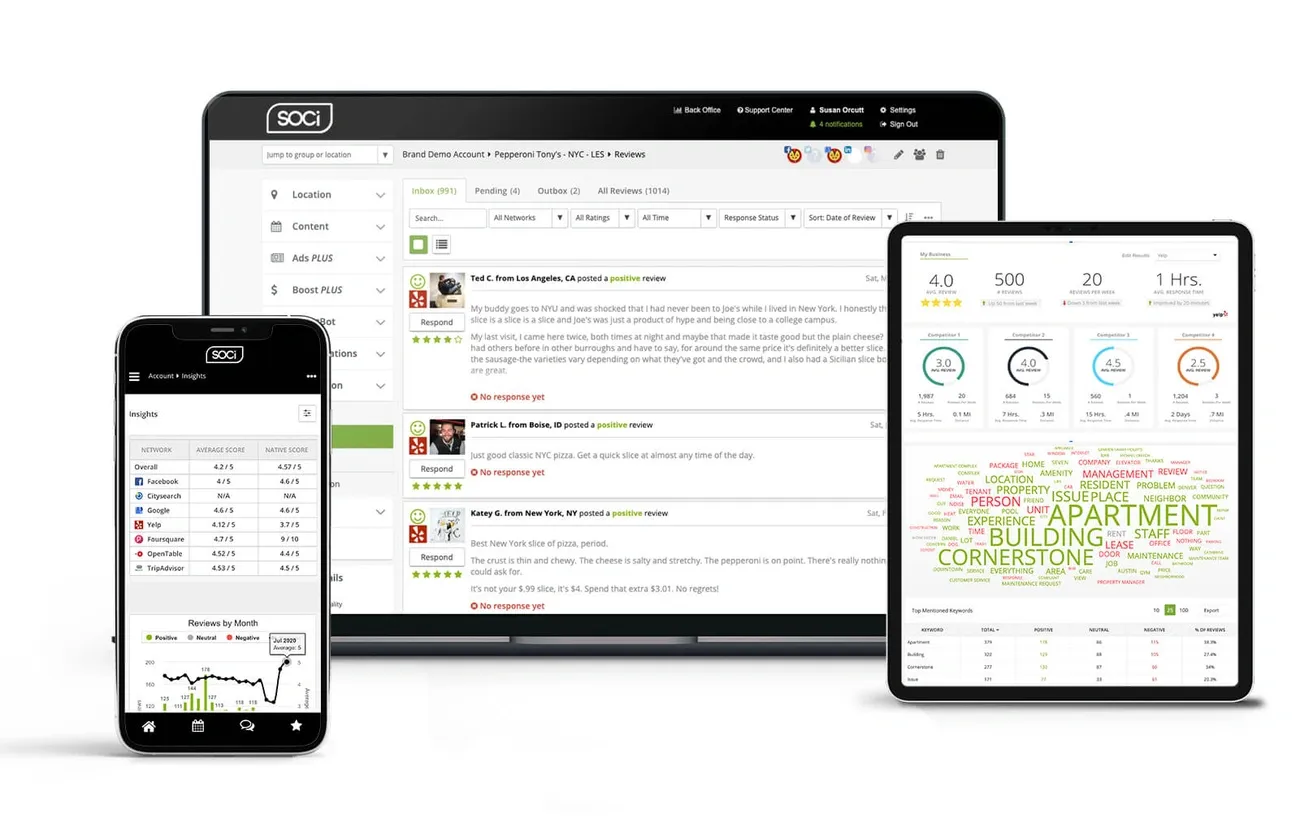
Image Source: SOCi
SOCi stands out as the premier CoMarketing Cloud platform. The platform caters specifically to multi-location enterprises that need to scale their online reputation management efforts through hundreds or thousands of locations at once.
SOCi key features
The Genius Suite sits at the heart of SOCi’s reputation management capabilities. This suite has Genius Reviews, Genius Social, and Genius Search.
SOCi pros and cons
Pros:
- AI-powered response generation that keeps brand consistency
- Tiered access system built for multi-location management
- Centralized dashboard that monitors all digital channels
- Sentiment analysis tools that measure customer experience
Single login system that creates efficient workflows
Cons:
- Most pricing details come through custom quotes
- Small businesses might find it complex
- Takes longer to learn than single-location tools
- Maximum benefits need full platform adoption
- Price point too high for small business budgets
SOCi pricing
SOCi keeps pricing simple with its Genius Suite packages. Public sources don’t share many pricing details.
Best use case for SOCi
SOCi works best for enterprise-level businesses with multiple locations.
ReviewTrackers
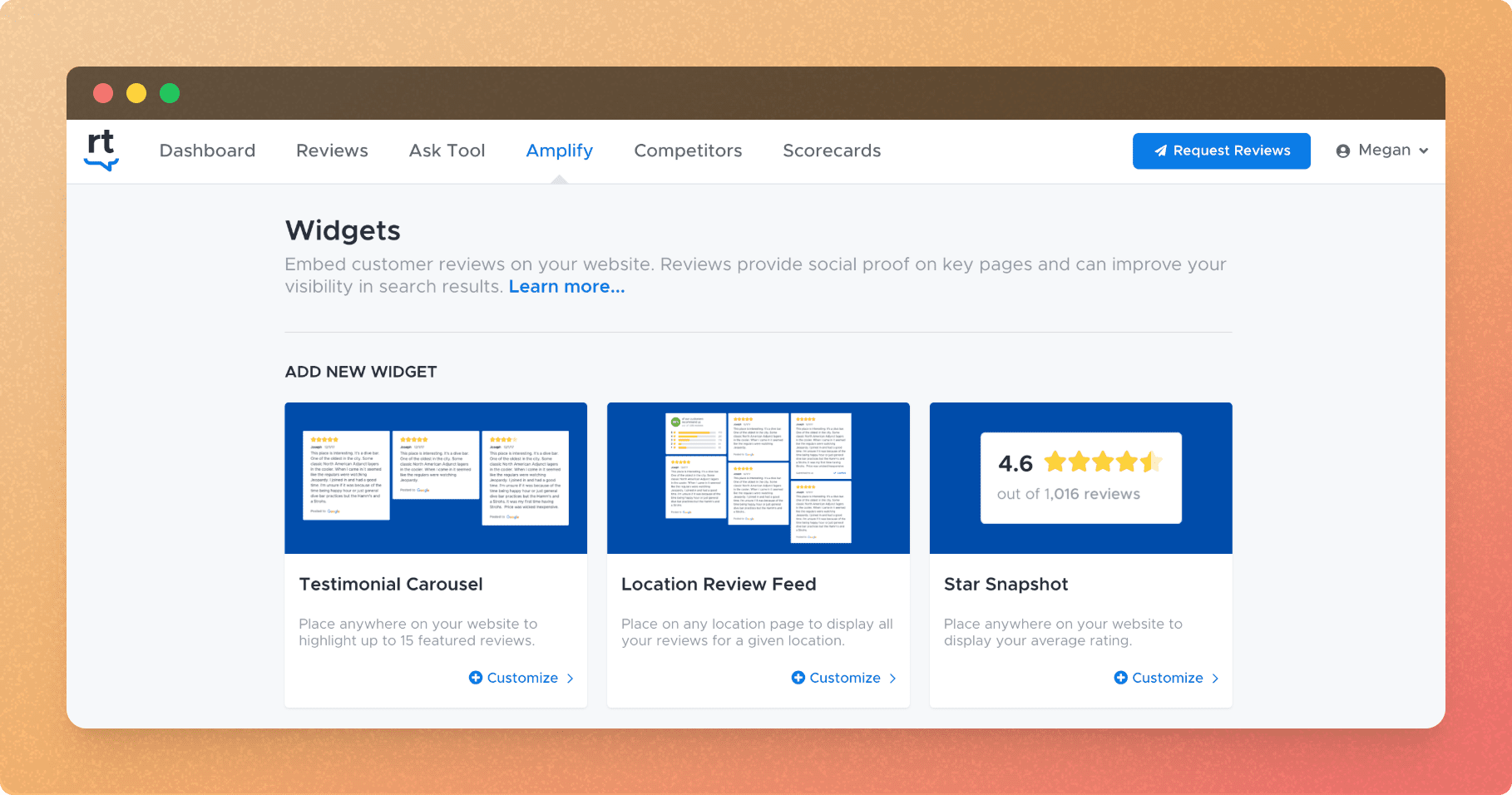
Image Source: ReviewTrackers
ReviewTrackers offers a complete reputation management and insights solution that enables businesses to enhance customer experiences through effective feedback management and analysis.
ReviewTrackers key features
ReviewTrackers pros and cons
Pros:
Connects with over 1000 apps and offers API access for workflow automation The customer success team consistently receives top marks and has won awards Accessible interface makes dashboard navigation straightforward Effective competitor comparison helps identify areas to improve Users are able to customize alerts based on specific monitoring criteria
Cons:
Price varies based on business size and needs, which might be tough for smaller budgets The analytics platform needs more sophistication Customer service intervention could be more proactive according to some users Some users find the reporting interfaces too simple Users must leave the platform to respond to certain review sources
ReviewTrackers pricing
Best use case for ReviewTrackers
Reviewshake
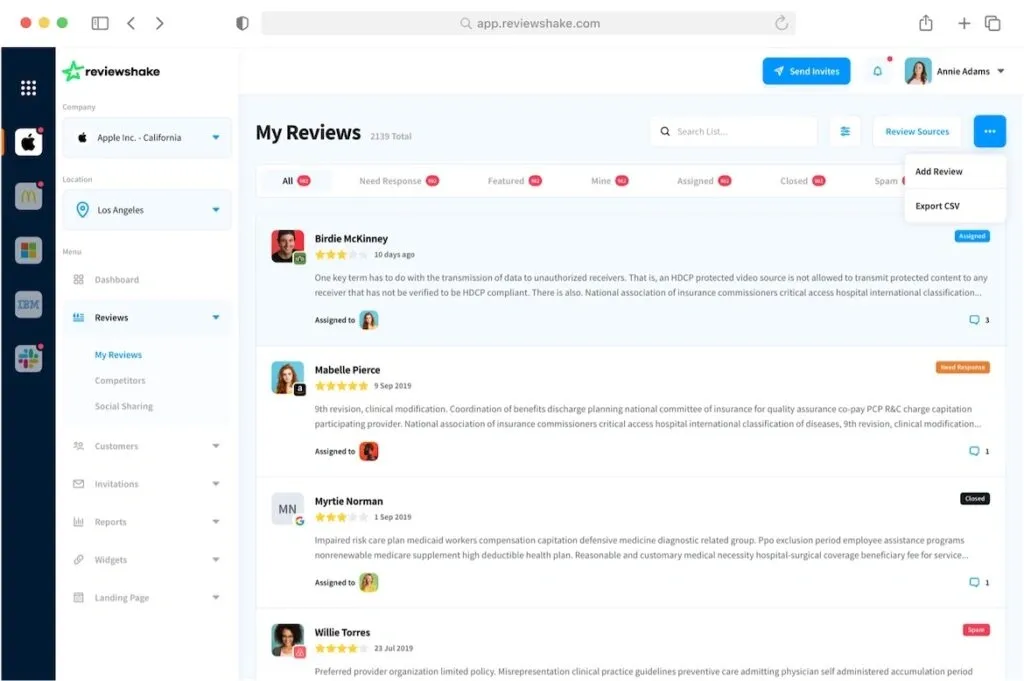
Image Source: ReviewsOnMyWebsite
Reviewshake key features
Reviewshake pros and cons
Pros:
Complete review management on 85+ websites for text and video reviews Budget-friendly plans from $79.00 per month Auto-marketing shares good reviews on social media and your website Detailed reports compare locations and competitors side by side White-label option lets agencies sell under their brand and domain
Cons:
New users might struggle to learn all the features Some users find feature pop-ups annoying - Display elements don’t offer much customization
- Success depends on regular management
- The basic plan restricts multiple business locations
Reviewshake pricing
Individual: $79/month – unlimited review profiles, 1 location, 1 user, 500 email invites Professional: $139/month – 2 locations, 20 users, 10 video reviews Business: $179/month – 3 locations, 100 users, 20 video reviews Agency: Starts at $199/month – built for managing multiple clients with white-label features
Best use case for Reviewshake
Mentionlytics
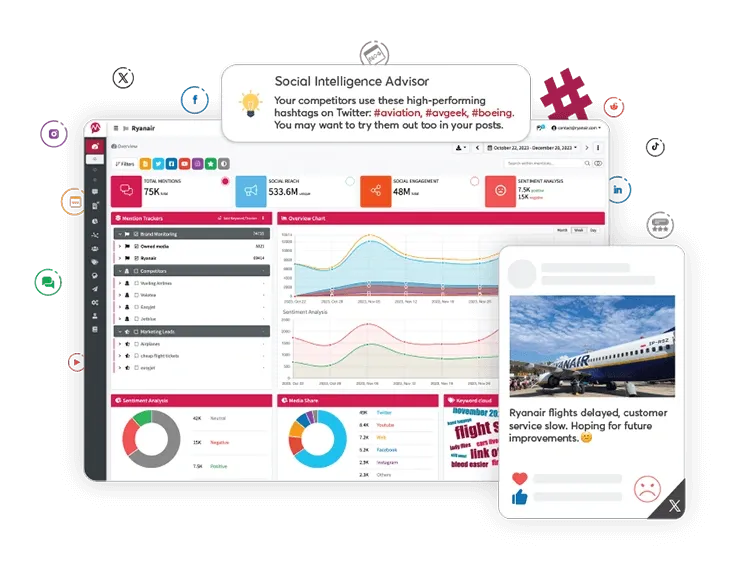
Image Source: www.mentionlytics.com
Mentionlytics uses powerful AI algorithms as its foundation. This intelligence monitoring platform tracks brand mentions across the web. It provides immediate insights and tailored advice to help you monitor your online presence comprehensive online presence monitoring.
Mentionlytics key features
The platform scans social media channels and the web to give you complete visibility into brand conversations.
Mentionlytics pros and cons
Pros:
The core team provides great problem-solving support Collaborative features make workflow smooth Simple setup guide with clear instructions AI-powered anomaly detection spots potential crises early Media monitoring analysis saves time with reports
Cons:
The user interface needs improvement Mobile app functionality is limited - New users might need time to learn social listening tools
Mentionlytics pricing
Mentionlytics has six pricing tiers with monthly and annual payment options:
Basic: $49/month – has 5 keyword rules, 5K monthly mentions Essential: $99/month – has 10 keyword rules, 15K monthly mentions Advanced: $199/month – has 15 keyword rules, 50K monthly mentions Pro: $299/month – has 25 keyword rules, 100K monthly mentions Agency: From $450/month – has 40+ keyword rules, 200K+ mentions Enterprise: From $950/month – has 100+ keyword rules, 300K+ mentions
Best use case for Mentionlytics
Businesses that want to prevent reputation crises through early detection will find Mentionlytics valuable.
YouScan
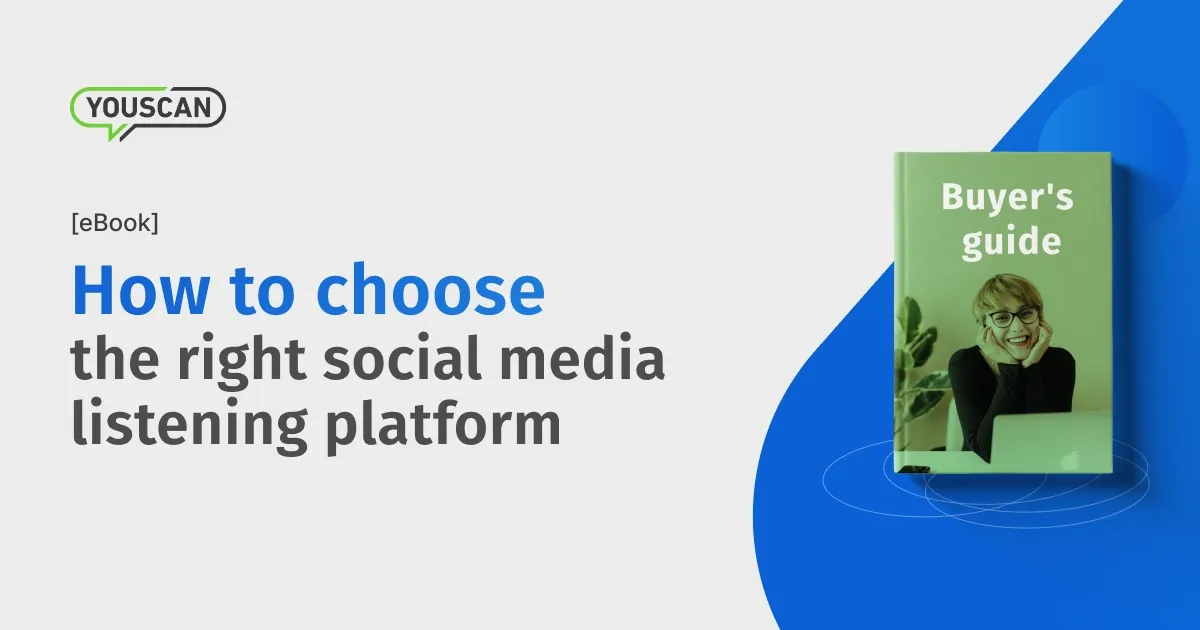
Image Source: YouScan
YouScan stands out from other reputation monitoring software through its advanced visual recognition technology.
YouScan key features
The platform’s AI-powered social listening goes beyond analyzing text.
YouScan pros and cons
Pros:
Leading image recognition technology spots brand logos even without text mentions Outstanding customer support responds quickly with individual-specific assistance Accessible dashboards and reporting show complex data clearly Automatic spam filtering removes bot content Rich social media coverage includes TikTok, Instagram, and YouTube
Cons:
Users describe the interface as austere and sometimes confusing Costs more than simple monitoring tools Some features have limited language options Users note restrictions in historical data collection Limited customization for automatic alerts
YouScan pricing
The Starter 3 plan costs $299/month with annual billing.
Best use case for YouScan
YouScan works best for brands that need a detailed digital reputation strategy with visual content monitoring.
Comparison Table
Digital Marketing and Reputation Management Software Comparison
| Tool | Starting Price | Key Features | Best Use Case | Notable Pros | Notable Cons |
|---|---|---|---|---|---|
| Birdeye | $299/month | – 200+ site monitoring – AI-powered responses – Review generation – Social media management | Multi-location businesses, healthcare providers, automotive services | – CRM integrations – Mobile access – AI sentiment analysis | – Premium pricing – Limited integrations – No free plan |
| Podium | $399/month | – SMS messaging – 24+ review site monitoring – Payment processing – Unified inbox | Retail, service businesses, healthcare, automotive dealers | – Text-based review collection – Secure payments – User-friendly design | – Unreliable alerts – Integration problems – High costs |
| Yext | $4/week | – 175+ platform listings – Review management – AI-powered search – Sentiment analysis | Large enterprises with multiple locations, healthcare, financial institutions | – Immediate notifications – Strong analytics – Competitor tracking | – Limited transparency – Steep learning curve – High multi-location costs |
| NiceJob | $75/month | – Automated review collection – Social proof widgets – Website building – Referral automation | Service-based small businesses, home services, healthcare | – Automated systems – CRM integration – Excellent support | – Limited free version – AI detection issues – Manual data entry needs |
| BrightLocal | $39/month | – Local rank tracking – SEO audits – Citation management – Review monitoring | Local businesses, marketing agencies, physical locations | – No recurring citation fees – White-label options – Complete local tools | – Slow report generation – No keyword research – Learning curve |
| SOCi | $119/month | – AI-powered responses – Multi-location management – Optimized workflows – Brand voice maintenance | Enterprise-level businesses, franchises, multi-location retailers | – Brand consistency – Tiered access – Centralized dashboard | – Limited pricing clarity – Complex system – Premium pricing |
| ReviewTrackers | $89/month | – 100+ site monitoring – Immediate alerts – Competitor analysis – Local listing management | Multi-location companies, hospitality, healthcare | – 1000+ app integrations – Strong support – Simple interface | – Variable pricing – Simple analytics – Limited service support |
| Reviewshake | $79/month | – 120+ site monitoring – SMS/email campaigns – Competitor analysis – Two-way SMS inbox | Small-medium businesses, service companies, agencies | – Complete coverage – Affordable plans – White-label options | – Learning curve – Intrusive pop-ups – Limited customization |
| Mentionlytics | $49/month | – AI-powered insights – Multi-language support – Boolean search – Team collaboration | Crisis prevention, marketing teams, multi-channel monitoring | – Helpful team – Workflow features – Clear setup guide | – Interface issues – Limited mobile app – Complex for beginners |
| YouScan | $299/month | – Visual recognition – AI sentiment analysis – Trend detection – ChatGPT integration | Brands with visual presence, large corporations | – Advanced image recognition – Excellent support – Spam filtering | – Complex interface – High pricing – Language limitations |
Take Control of Your Brand’s Digital Reputation
Finding Your Ideal Reputation Management Solution
Your business size, industry, and specific needs will determine the right online reputation management software. Recent studies show that 93% of consumers check online reviews before buying anything. This makes investing in reputation management tools a necessity, not just an option.
Each platform brings something different to the table. Birdeye and Podium make customer communications smoother. Yext manages listings on more than 175 platforms. Small businesses love NiceJob for its automation features. BrightLocal specializes in local SEO. Multi-location brands benefit from SOCi’s large-scale solutions. ReviewTrackers shines with its analytics. Reviewshake packs budget-friendly features. Mentionlytics and YouScan add AI and visual recognition to the mix.
Smart businesses look at several key factors before picking a reputation management platform. These include budget limits, needed features, user-friendliness, integration options, and room for growth. Prices start at $39 per month with BrightLocal and can go above $1,000 for enterprise solutions. Many providers adjust their pricing based on business size and needs.
The digital world changes faster every day. This makes detailed reputation management more significant than ever. Companies that watch and respond to customer feedback on multiple platforms gain a real edge. They build trust, boost visibility, and create loyal customers.
Your choice of software matters less than taking action. Reputation management is the life-blood of business success in 2025 and beyond. Good software helps protect your brand and turns feedback into valuable insights that accelerate growth and improve brand image.
FAQs
Q1. What factors should I consider when choosing reputation management software?
When selecting reputation management software, consider your budget, required features, ease of use, integration capabilities, and scalability. Also, evaluate the platform’s ability to monitor multiple review sites and social media channels relevant to your business.
Q2. How can online reputation management software benefit my business?
Online reputation management software can help you monitor and respond to customer feedback across multiple platforms, improve trust and visibility, enhance customer loyalty, and provide valuable business intelligence to drive growth and improve brand perception.
Q3. What are some effective strategies for protecting my online reputation?
Key strategies include monitoring your online presence regularly, creating a crisis response plan, encouraging positive reviews and testimonials, actively managing social media, promoting employee advocacy online, and being proactive in addressing potential issues.
Q4. How much should I expect to invest in reputation management software?
Costs vary widely based on business size and needs. Small businesses might spend $500-$2,500 per month, mid-sized businesses $2,500-$10,000 per month, and large enterprises $10,000-$50,000+ per month for comprehensive services. Many providers offer tiered pricing based on specific requirements.
Q5. Which reputation management software is best for multi-location businesses?
For multi-location businesses, platforms like SOCi, Birdeye, and Yext are particularly effective. These solutions offer features like centralized dashboards, multi-location management capabilities, and tools to maintain brand consistency across numerous locations while allowing for local personalization.





